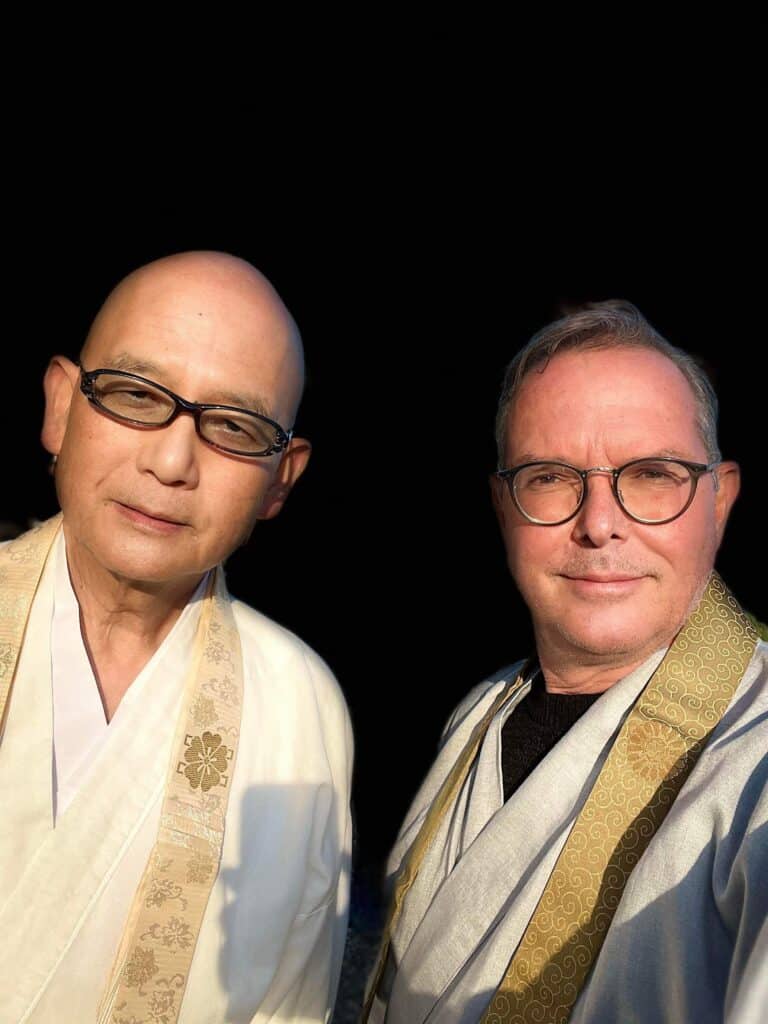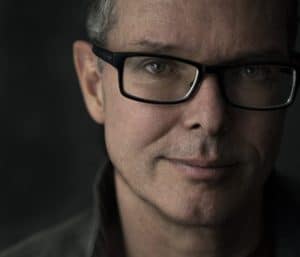by Takeda Hakusai Ajari

I became a monk on Mount Hiei, studied Tendai Esoteric Buddhism, and now belong to the Shingon Esoteric Buddhism sect. However, even before becoming a monk, I had spent many years studying Japan’s traditional religions such as Shinto and Shugendo. During my time as a priest at the Shingon temple, I was introduced to Frans Stiene by a capable American monk from the Tendai sect.
Subsequently, focusing on the Buddhist aspects of Usui Reiki Ryōhō that Frans was interested in, I have intensively instructed him about the theories and practices of traditional Japanese religions, which Usui-san is believed to have learned through self-study.
Frans comes to Japan, diligently continuing to learn the essence of Japan’s traditional religions that underpin Usui Reiki Ryōhō. Not only in Buddhist practices but also during his visit last year [2023], he deepened his experiences in Shinto practices.
For the practice of Usui Reiki Ryōhō, which aims to heal others’ minds and bodies, it goes without saying that the state of the practitioner’s mind significantly influences the effectiveness of Reiki on the clients. It’s impossible for someone who cannot maintain inner peace to provide healing to others. Therefore, Usui-san articulates the following mindset for Reiki practitioners and teachers as the spiritual medicine for all diseases:
– Just for today
– Do not anger
– Do not worry
– Be grateful
– Practice diligently
– Be kind to yourself and others
While these principles are known as the Five Reiki Precepts, it’s evident they are influenced by Mahayana Buddhism. The principles of not being angry and not worrying are drawn from the Buddhist precepts, which aim to address the three poisons of greed, anger, and ignorance.
A distinctive feature of Buddha’s teachings is the objective understanding of human mental states as “reactions of the mind.”
Anger stems from dissatisfaction with the present situation, arising from excessive greed and desire, which is the first of the three poisons in Buddhism. Worrying involves imagining negative elements from the present situation, feeling anxious about them, and complaining.
In reality, both anger and worry, as well as anxiety, ultimately lead back to delusion (ignorance), the final of the three poisons in Buddhism. I believe Frans’ standpoint is to approach these precepts not merely as ethical demands but from the perspective of Buddha’s enlightenment.
In Mahayana precepts, there is not only the admonition to abstain from wrongdoing and to do good deeds, but also the precept to work for the benefit of sentient beings. While precepts are often seen as negative injunctions against certain actions, the essence of Mahayana precepts is to actively encourage positive actions.
Shining a light on the ignorance within our hearts, living a life where we restrain anxiety, worry and anger is self-benefit (自利jiri) in Buddhism. While maintaining this self-restraint, striving to be kind to others, remembering gratitude and diligently performing the tasks given to us is altruism in Buddhism (利他rita).
A bodhisattva, who naturally practices self-benefit and benefiting others, embodies the ideal human depicted in Buddhism.
Learning that Usui-san provided Reiki free of charge to many victims during the Great Kanto Earthquake reveals nothing but the practice of bodhisattva, prioritising the salvation of sentient beings above all else. I believe Usui-san envisioned such a portrayal as the ideal practitioner and teacher of Usui Reiki Ryōhō.
The foremost characteristic attributed to a bodhisattva is “compassion.”
In professions like healing, where one interacts with those who are unwell, a compassionate heart is indispensable. It’s evident that Usui-san, who deeply studied Japanese Buddhism, believed that compassion was essential in the practice of Reiki.
Before the importation of Western medicine in modern times, there was an era in our country when Buddhist monks served as doctors. This historical context is due to the deep connection between medicine and compassion in Buddhism.
I think this also applies to Usui Reiki Ryōhō. Buddhism is essential to the practice of Usui Reiki Ryōhō. I think it is important to create an environment where it is important for clients and students to receive treatments and teachings from Reiki teachers who have studied Buddhism.
Buddhism teaches wisdom and compassion as its twin pillars. Hence, we refer to the Buddha as a “precious being with two legs.” Frans Stiene particularly emphasises “compassion” in his Reiki practice and teachings. As his close Japanese friend, I believe I know better than anyone else that his assertions are genuine. Although our interaction spans a long period, his warm and compassionate nature remains unchanged.

